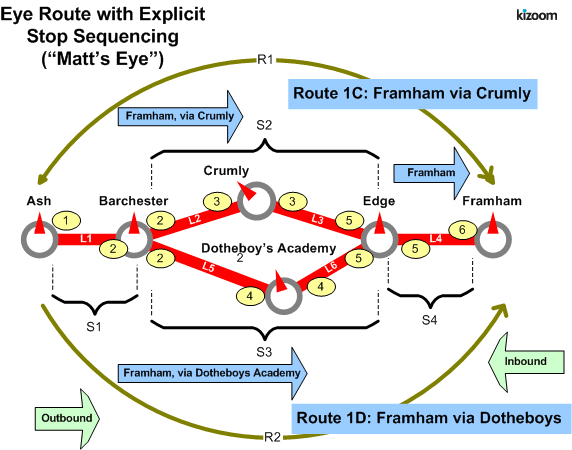TransXChange
Examples 2.1 - Eye route
Summary
A line running over an eye physical shaped route, with two alternative branch variants.
- Multiple routes composed of some shared route sections
- Multiple journey patterns composed of some shared journey pattern sections
- Stop Sequence Numbers to control the timetable presentation matrix
- Bilingual support.
- Dynamic Destination Displays
- Different Running Boards.
- Registration Schema
Published as: PDF (English) Published as: PDF (Cymraeg)
Route Map

Timetable
Ash to Framham, via Crumly or Dotheboy's
| #1 | #2 | SequenceNumber | ||||
| English | Welsh | 1C | 1D | # | ||
| Ash | 10:00 | 11:00 | 1 | |||
| Barchester | 10:10 | 11:10 | 2 | |||
| Crumley | 10:12 | ------- | 3 | |||
| Dotheboy's | Dotheboy ysgol | ------- | 11:15 | 4 | ||
| Edge | Ymyl | 10:15 | 11:21 | 5 | ||
| Framham | Llanpentre | 10:20 | 11:26 | 6 |
The XML Representation
XML Document (English) XML Document (Cymraeg)
Service Registration
- There is a single Operator. O1 - 'Dai Larid
- The service is registered, classified as a rural service with normalstopping
Service Structure
- There is a single Service instance SV1, with two Line instances: '1C' and '1D'
- There are five StopPoint instances. Three of the stops have bilingual names.
- There are four RouteSection instances, RS1-RS4,
with RouteLink instances to connect the six stops. See Diagram.
- RS1 has RL1 only, connecting A-B
- RS2 has RL2 & RL3, connecting B-C-E.
- RS3 has RL5 & RL6, connecting B-D-E.
- RS4 has RL4 only, connecting D-F
- There are two Route instances;
- R1, comprising RouteSectioninstances RS1-RS2-RS4, such that the route links run A-B-C-E-F.
- R2 ,comprising RouteSectioninstancesRS1-RS3-RS4, such that the route links run A-B-D-E-F.
- There are four JourneyPatternSection instances JS1-JS4; corresponding to the route sections, and containing JourneyPatternTimingLinkinstances. JPTL1 - JPTL6, which project onto the respective RouteLink instances RL1-RL6.
- There are two JourneyPattern instances,
- JP1 running A-B-C-E-F over R1, and comprising JourneyPatternSection
instances JS1-JS2-JS4 , with timings on each of the timing links. A preferred stop sequence is specified:
- JS1 [ JPTL1 [10 mn, from:1, to: 2] ]
- JS2 [ JPTL2 [2 mn, from:2, to: 3], JPTL3 [3 mn, from:3, to: 5] ]
- JS4 [ JPTL4 [4 mn, from:5, to: 6] ]
- JP2 running A-B-D-E-F over R2, and comprising JourneyPatternSection instancesJS1-JS3-JS4 A with timings on each of the timing links. A preferred stop sequence
- JS1[ JPTL1[10 mn, from:1, to: 2] ]
- JS3[ JPTL5[5 mn, from:2, to: 4], JPTL6 [6 mn, from:4, to: 5] ]
- JS4[ JPTL4[4 mn, from:5, to: 6] ]
- JP1 running A-B-C-E-F over R1, and comprising JourneyPatternSection
instances JS1-JS2-JS4 , with timings on each of the timing links. A preferred stop sequence is specified:
- There are two VehicleJourneyinstances:
- VJ1 following JP1 over A-B-C-E-F , starting at 10:00.
- The Dynamic Destinationat the beginning shows :'Framham, Via Crumly'
- The journey pattern specifies that the Dynamic Destination changes at Edge to just'Framham'
- VJ2 following JP2 over A-B-D-E-F , starting at 11:00, with a longer time for JPTL4
- JS4[ JPTL4[6 mn, from:5, to: 6] ]
- The Dynamic Destination at the beginning shows :'Framham, Via Dotheboys's'.
- The journey pattern specifies that the Dynamic Destination changes at Edge to just'Framham'
- VJ1 following JP1 over A-B-C-E-F , starting at 10:00.
Operational Data
- Different DynamicDestinationDisplays are used for the service via Crumley and via Dotheboy's.
Use of Sections & Stop Sequence Numbers
Sections are used to reuse links between journeys.
Stop sequence numbers are used to coerce a specific ordering of the stops within a matrix timetable when published. The following diagram shows the journey pattern sections, with individual timing links annotated with stop section numbers.

Bilingual Support
The last three stops of the route lie within a Welsh speaking area and have bilingual stop names. Most text elements in TransXChange have
- The NaPTAN StopPoint definitions include alternative common names and other descriptor elements in Welsh
- The primary language for the TransXChange document is specified on the root TransXChange element - for Welsh this is 'cy'.
- When published in Welsh, the Welsh versions of the stop names are used, along with any Welsh alternatives for Destinations, Notes and other text that is available from the originating system.
Cymraeg XML | published as PDF
Alternative Representation
The following shows the same example published without explicit stop sequence numbers
Unsequenced XML | published as PDF
Page last updated: 2013/04/13


